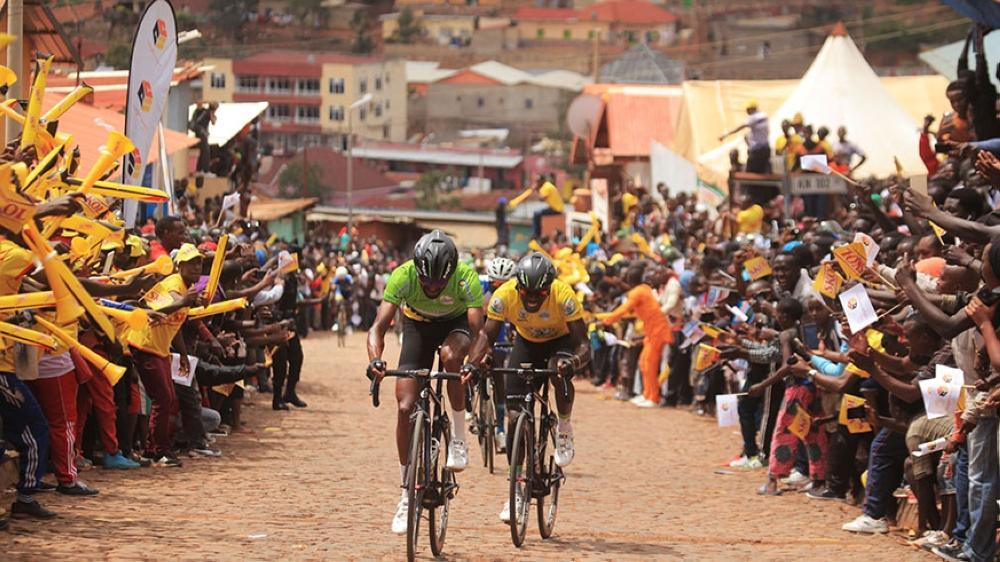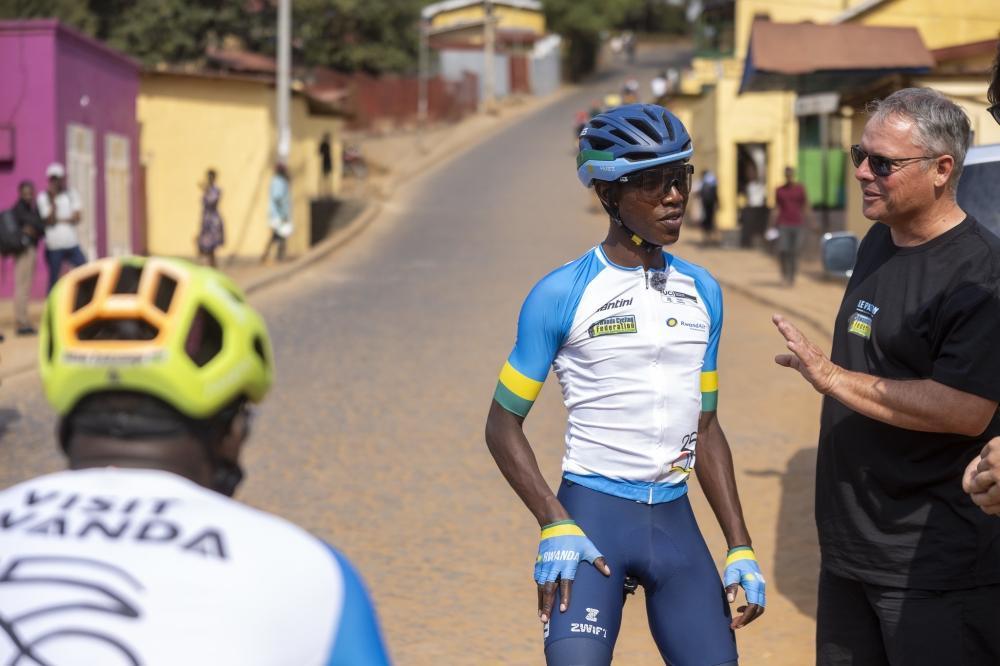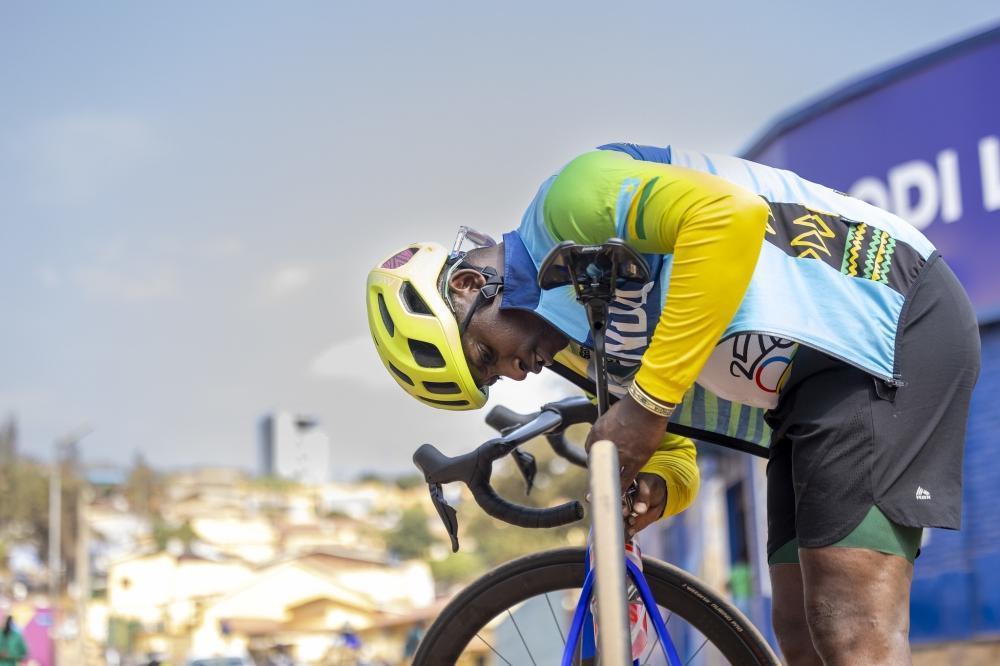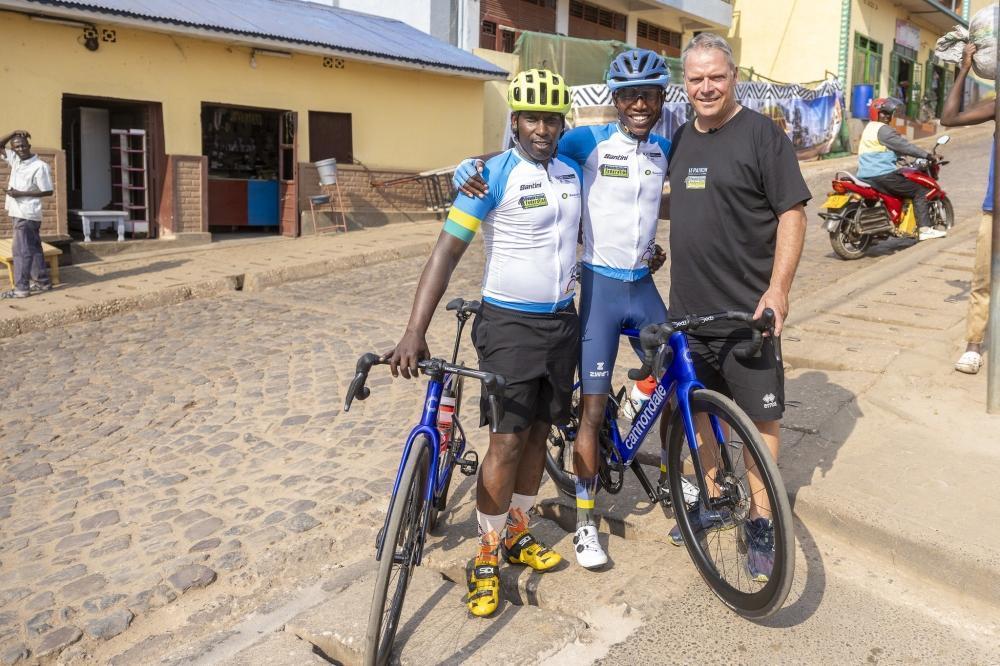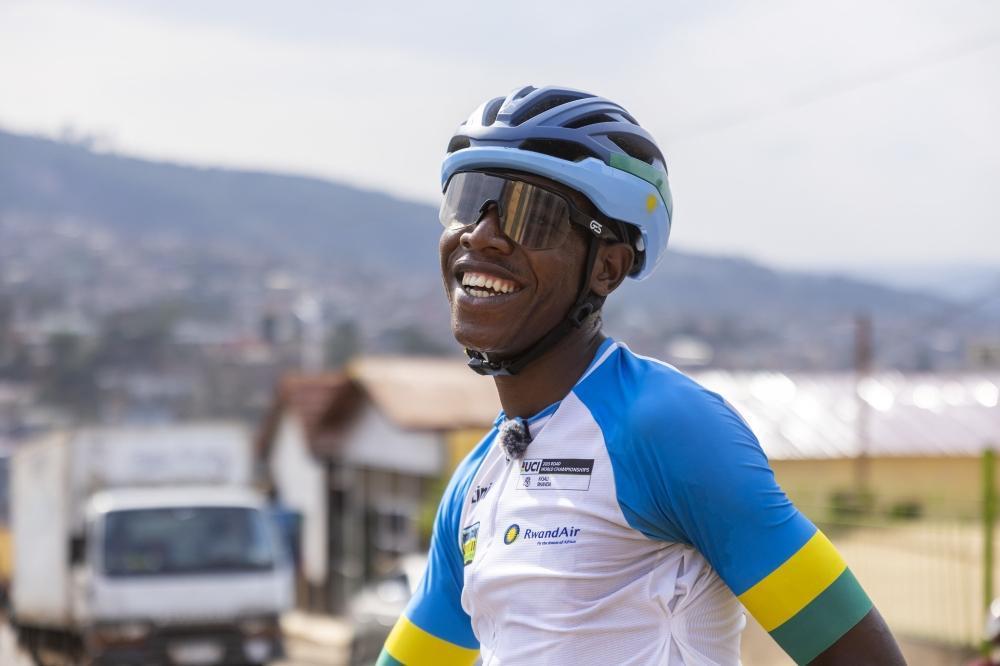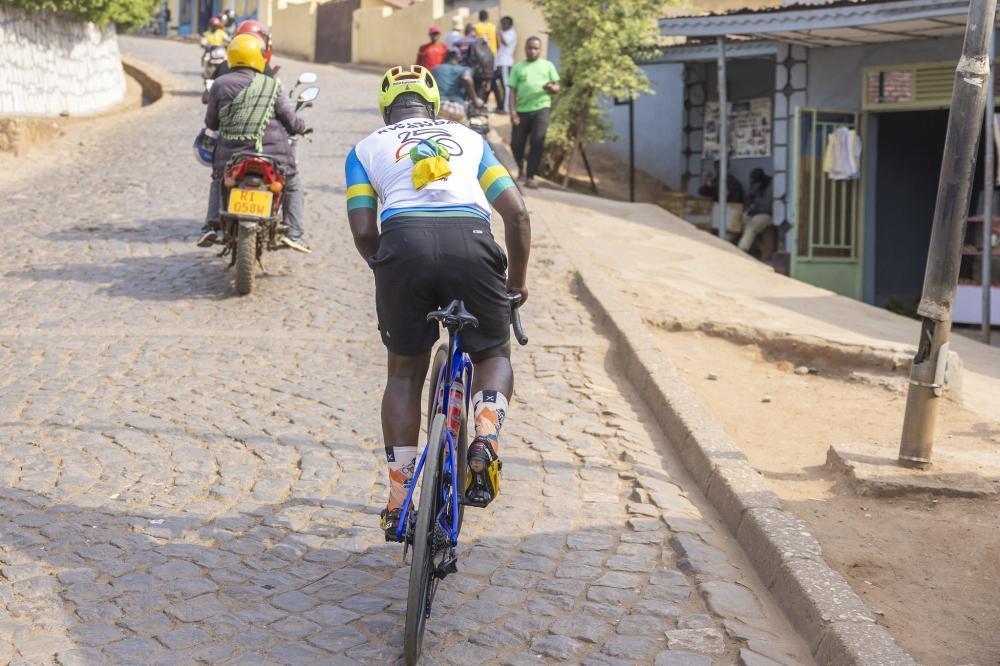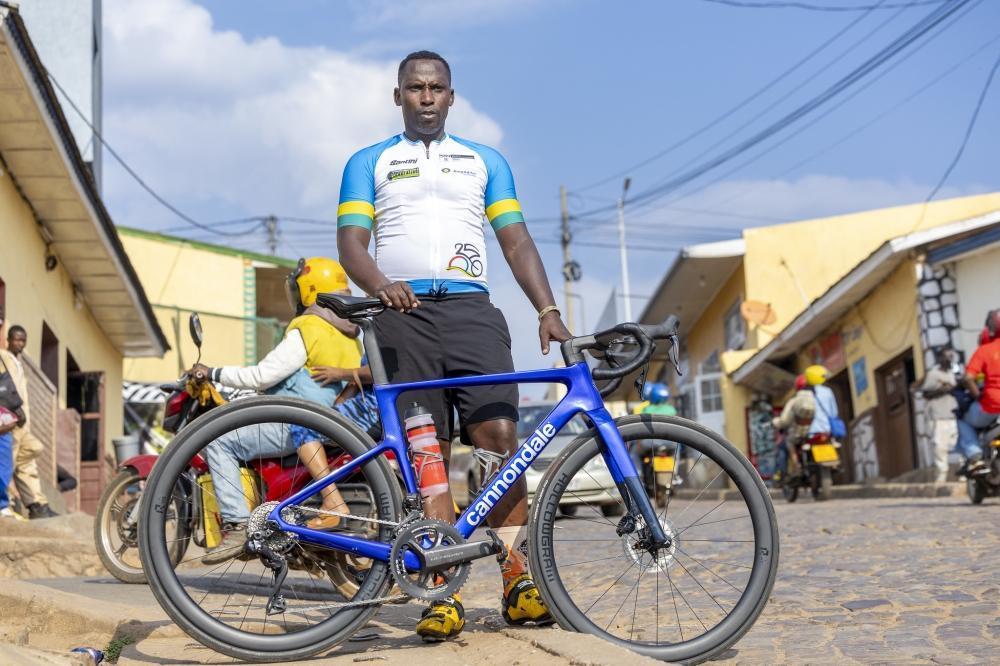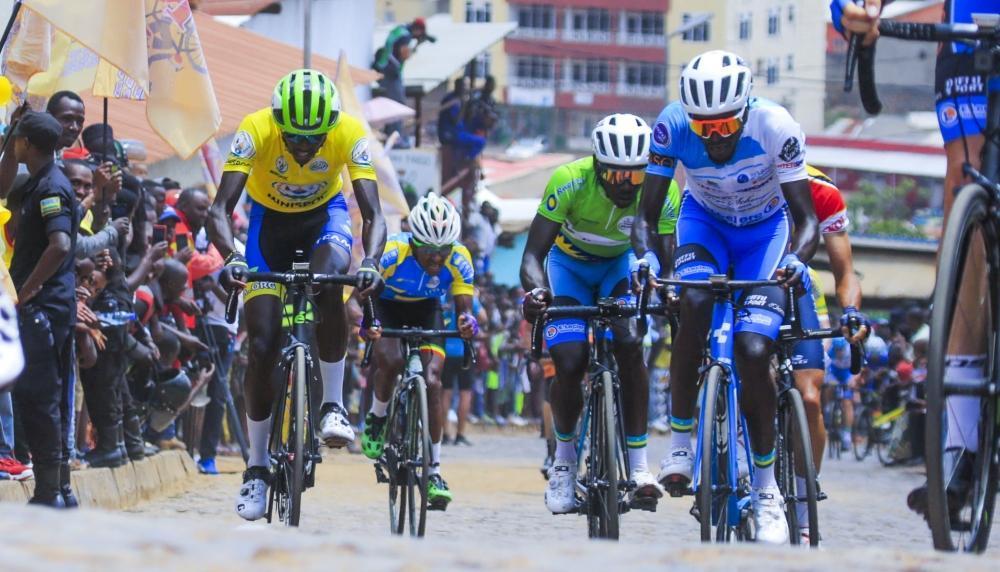Africa-Press – Rwanda. On a sunny Friday afternoon, I found myself standing at the foot of the Mur de Kigali, the legendary cobblestone climb — one of the toughest challenges awaiting global cycling stars whose sights are set on the road race rainbow jersey on the final day of the UCI Road World Championships, scheduled for September 21-28.
This climb, affectionately known as Kwa Mutwe, is not just a road. It is a wall of history, sweat, resilience and dreams.
As I looked up, Eric Manizabayo, one of Team Rwanda ’s riders preparing for the World Championships, was completing his training lap at the climb. His face glistened with effort, every pedal stroke reflecting the enormity of what lies ahead: 267.5 kilometers of road, 5,475 meters of climbing, and the weight of an entire nation’s hope.
I didn’t get the chance to talk to him, but I saw retired cycling legend Nathan Byukusenge, who was closely monitoring his training.
Manizabayo listens to the coach’s advice during a training session at Mur de Kigali. Photo by Olivier Mugwiza
Byukusenge is regarded as one of the pioneers of Rwandan cycling, having who carried the nation’s cycling dream for 13 years.
In his prime, he remained a guiding figure at the annual race since it was added on Africa tour calendar in 2009.
On this day, he was advising Manizabayo on how best to tackle the punishing course of the Mur de Kigali.
“As a coach, my advice to riders, especially for Team Rwanda, is to fight hard to remain among the top five leaders because the Wall of Kigali has become decisive — if you’re struggling with a big group in front of you, it’s difficult to recover,” Byukusenge told Times Sport.
The UCI Road World Championships in Kigali will feature individual time trials, team time trials, and road races across men’s and women’s elite, under-23, and junior categories. But it is the men’s elite race that is expected to define just how tough the 98th edition will be.
The grand finale, on September 28, will start and finish at the Kigali Convention Centre (KCC). Riders will pass through major landmarks such as RDB, MTN, Nyarutarama, Golf Course roads, Kacyiru, RIB headquarters, and the iconic cobblestone section in Kabindi.
This stage will include an extended and more demanding course compared to the previous three days of road races, featuring the climb to Norvège Hill in Karama, a descent through Nyabugogo, and loops around the Mur de Kigali.
The Mur de Kigali itself is a 500-metre cobblestone climb with an elevation gain of about 100 metres.
Byukusenge explained that riders should conserve their energy until reaching Norvège Hill, then attack from Kitabi, continue past Nyamirambo Stadium, and safely descend to Kimisagara.
“From there, those who can maintain the pace on the Mur de Kigali while leading the peloton can secure vital points on that hilly stretch, positioning change to win men’s elite road race,” he noted.
The route will then take riders through ‘Kuri 40’, Onatracom, Downtown, the city centre roundabout, and Mediheal Polyclinic before hitting the stony road near Women Foundation Ministries in Kimihurura. From there, they will head toward the Ombudsman’s Office traffic lights and sprint to the finish line at KCC.
Byukusenge believes that the Mur de Kigali was one of the key features that helped Rwanda secure the bid to host the World Championships.
How ready are Rwandan riders?
A group of 34 riders including 21 men and 13 women, has been in the camp in Musanze, then in Bugesera, preparing for the global cycling event which has witnessed nothing short of a nightmare for Rwandan cyclists in the past.
Rwandan has had representatives at the most prestigious cycling event but none managed to finish the race.
But Byukusenge believes the current roster can end the unwanted narrative considering that they have an idea of what their home terrain is like.
“We had enough time to train. We had different sessions during which I told riders what they need to do to perform well. Competing on home soil is a huge motivation, and we’re hungry to see Rwanda win its first rainbow jersey,” he said.
Byukusenge retired in 2017, just a year before Rwanda formally submitted a bid to host the World Championships.
He said that witnessing such a big cycling event as a coach feels like a dream fulfilled.
Nathan Byukusenge, Eric Manizabayo and head coach pose for a photo at Mur de Kigali. Olivier Mugwiza
“To me, it’s huge. During my prime, I had the chance to race at the 2016 Olympics, which is different from the World Championships. Now, seeing the generation I’ve trained get this opportunity is a source of pride, not only for us coaches but for the country at large,” he said.
He called on Rwandans to show support along the routes, cooperate with security teams, and welcome visitors warmly to uphold the country’s image.
Team Rwanda rider Eric Manizabayo speaks to a journalist after a training session at Mur de Kigali. Photo by Olivier Mugwiza
Veteran Nathan Byukusenge climbs Mur de Kigali during a training session on September 13. Photo by Olivier Mugwiza
Former Team Rwanda rider Nathan Byukusenge at Mur de Kigali
Riders climb the Mur de Kigali, the legendary cobblestone climb — one of the toughest challenges awaiting global cycling stars. Photo by Sam Ngendahimana
For More News And Analysis About Rwanda Follow Africa-Press

